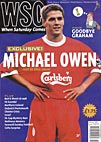 From one of Australia's most promising lethal strikers to hate figure and team nuisance, Matthew Hall investigates Celtic's latest signing
From one of Australia's most promising lethal strikers to hate figure and team nuisance, Matthew Hall investigates Celtic's latest signing
Prior to finalising the £3 million transfer of Mark Viduka from Croatia Zagreb to Celtic, Parkhead officials – wary of adding another dodgy portrait to the club’s Transfer Hall of Shame – made three trips to Croatia to investigate their potential new striker’s state of mind. Three trips? What were they doing all the while?
Viduka arrived in Zagreb in 1995. Not yet 20, the previous two seasons he had been voted Australia’s best home-based player and was the Australian League’s top scorer with his club, Melbourne Knights.The Knights are not just any club. Tightly entwined with Melbourne’s Croatian community, the club crest features the red-and-white Croatian checkerboard. The stadium is in an almost unreachable outer suburb. A rival club’s chairman once articulately described the ground as a “cold hole of Hell”. Fittingly, Iran were sent to train there in the run-up to the 1997 World Cup play-off. During the early 1990s, those few spectators who did make it out to the games were invited to enlist in the Croatian army. It’s that kind of place.
Viduka was marked for big things. Following his showing at the 1995 World Youth Championship, overseas clubs swooped. Sporting Lisbon, Real Madrid, and Borussia Dortmund were all on the phone. In a megabuck deal, Viduka instead chose to go to Jubilo Iwata in Japan. Then, President Franjo Tudjman of Croatia breezed into Melbourne on diplomatic business. Viduka was invited to lunch and taken for a spin in Tudjman’s private jet. A week later Viduka was in the red, white and blue of (not coincidentally) Tudjman’s club – Croatia Zagreb. Australians scratched their heads. Either Viduka was dumb. Or he was receiving advice from very strange quarters.
“I wasn’t too keen on going over there,” Viduka candidly told an Australian magazine 18 months ago. “If Tudjman hadn’t asked I wouldn’t have gone.”
Despite having Croatian heritage, Viduka discovered Croatia was a little different to the idealised picture painted by the sentimental Melbourne expats. Mark came face to face with the reality of the civil war when he met relatives who had been involved in the military offensive reclaiming “homelands” from Serbia; team-mates teased him as he wondered what to do if bombs fell on Zagreb. He then disturbed team morale by unwittingly displacing the team’s regular penalty taker and found himself splashed across the pages of the newspapers with “quotes” he knew he hadn’t said. He craved Weetabix, KFC and McDonald’s. All this in just his first weeks.
His spirits were raised by the arrival in Zagreb of a crew from TV show Futbol Mundial. They turned out to be Australian. “It’s good to find Australians in Europe,” he wrote in his diary at the time. “Finally, you can understand someone properly.”
Understanding Viduka, though, has never been an easy undertaking. Terry Venables experienced the complexities involved with him during Australia’s World Cup campaign. Croatia Zagreb refused to release him for World Cup qualifiers, citing injury. Tudjman had reportedly called Viduka in for “a chat”. Then the player went AWOL. He was eventually found at a Croatian holiday resort.
Doubts were cast over how much Viduka wanted to play for his country. After all, said detractors, he’d worn a red, white, and blue armband (which “represented” Croatia, they suggested) while captaining Australian youth teams. Reports filtered back from Zagreb that Viduka “regretted” not playing for Croatia. Bizarre nationalist propaganda? No one could tell what was fact or fiction.
By chance, Venables met Viduka when Croatia Zagreb played Newcastle United in a 1997 Champions League qualifier. Viduka swore to the Aussie coach that there had been a “misunderstanding”. Everyone was happy families until his club again refused to release him for a friendly against Tunisia. Venables fumed. Viduka chose Australia and scored in a 3-0 win. For his trouble, Venables received death threats from Croatia.
Viduka brawls with Zagreb journalists and the fans hate him, wrote a mocking Scottish press after Viduka fled back home before playing a game for Celtic. They guessed “Marko” would not be up to the Glasgow goldfish bowl.
Viduka arrived at Parkhead from another football planet. A long way from Glasgow and a long, long way from Melbourne. The Scottish football public might imagine he did not know what he was letting himself in for. But maybe the truth is that it was Celtic, for all their fact-finding trips, who missed the point.
From WSC 144 February 1999. What was happening this month